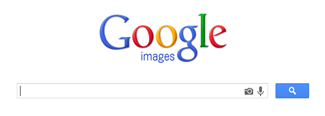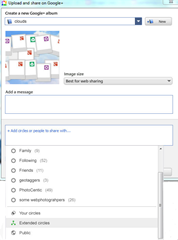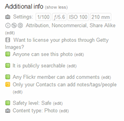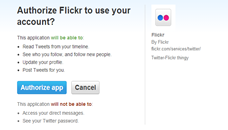There are many services that offer to share our photos on-line, and most, specifically the social media places, make it very easy but have defaults that mean your photos are being shared with anyone with net access. Perhaps you just wanted to share your photos with a few friends of family members. To really scare yourself, try finding some of your own images on-line  using google’s neat reverse image search. To do that just drag and drop a photo you want to check onto the little camera icon on the google’s images search screen.
using google’s neat reverse image search. To do that just drag and drop a photo you want to check onto the little camera icon on the google’s images search screen.
Ok now your scared! Time to pause and check whether that photo also lets others know where you live. You can find the extra information buried in your on-line photo by copying its URL to metapicz
So how do you fix it so your images and the hidden information they contain are not being shared with everyone in the future? Here are 5 steps you can take.
1) Make sure you know and set appropriately the default sharing setting when you upload photos. Most of the specialist photosharing sites like flickr, google+, photobucket, smugmug etc have a multi-level security/sharing system for just family, friends or then the public. Google+ have the added organizational control of just sharing with your selected circles. Some cloud based photo services like Skydrive, and Drop  Box also have multi-level sharing security and the private side normally involves sending those you wish to share with, a secure link (ie it has an access password/switch built into the link). A big limitation of these systems is in the photo uploaders they provide, which often have public set as their sharing default. So you can unknowingly make your photo available to everyone. So it is in your interest to set the default to private and only set those you intend to share as public on an individual photo basis.
Box also have multi-level sharing security and the private side normally involves sending those you wish to share with, a secure link (ie it has an access password/switch built into the link). A big limitation of these systems is in the photo uploaders they provide, which often have public set as their sharing default. So you can unknowingly make your photo available to everyone. So it is in your interest to set the default to private and only set those you intend to share as public on an individual photo basis.
 2) Be careful that you don’t share links to otherwise private photo, by reposting to public sites (like you blog or a social network site like twitter). in those systems that do allow you to share your images on another service such as facebook or twitter, Often they use some variant of OAuth to establish the authority to post on the attached site, unfortunately they seldom inherit the same privacy setting from your original post and the photo is posted as public. Generally if there is no mention of sharing security when you do the authorization there will be none (eg Sharing to twitter from flickr, even if the photo is private on flickr once it is shared to twitter it will be publically viewable on twitter)
2) Be careful that you don’t share links to otherwise private photo, by reposting to public sites (like you blog or a social network site like twitter). in those systems that do allow you to share your images on another service such as facebook or twitter, Often they use some variant of OAuth to establish the authority to post on the attached site, unfortunately they seldom inherit the same privacy setting from your original post and the photo is posted as public. Generally if there is no mention of sharing security when you do the authorization there will be none (eg Sharing to twitter from flickr, even if the photo is private on flickr once it is shared to twitter it will be publically viewable on twitter)
3) If you don’t want strangers to find out where you live, work, go to school. Consider turning off the GPS in your phone, or finding the setting in your photo uploader to remove geotags/geolocation data. Flickr has a nice geo fence feature that allows  you to supress showing location if your are close to sensitivity place (eg home, school etc). Lightroom has a setting to remove any geolocation data when posting an image via their Export or Publishing Services. You can also control the types of metadata exported.
you to supress showing location if your are close to sensitivity place (eg home, school etc). Lightroom has a setting to remove any geolocation data when posting an image via their Export or Publishing Services. You can also control the types of metadata exported.
4) Remove the photos from google search if necessary. I haven’t been a fan of the google’s official forums because they are often hard to figure out the context of the advice being given and even what the FAQs are actually asking. My impression has been that google staff must not actively moderate their forums or perhaps even read them (maybe I’m being a bit unkind here). However the Picasa Resources site does provide some good discussion on key FAQs about picasa and its advice on How to remove your images from google search gives some good advice on what to do, albeit quite technical advice. The photos don’t have to have been shared via picasa.
5) Don’t use Facebook (and probably Instagram), for any photo you don’t want to share with the world because someone else liking or tagging your photo will start sharing that with all their friends and so on. These access links can spread quickly and soon many folk you don’t know will be able to see and use your photos. Also the facebook TOS (terms of service), means they assume ownership of anything you post. I don’t have a facebook account, and I don’t want to be accused of facebook bashing but I understand in the past it wasn’t so easy or obvious how to remove and permanently delete photos, I gather facebook has yielded to pressure and here is a link to Steve’s Digicam with instruction on deleting facebook photos and albums.
So don’t panic, make sure you understand the sharing security on your favourite photo service and set the defaults appropriately. It is certainly not wrong to share your photos with others. It might just be wise to do little bit of checking right now for any existing images you don’t want shared publically.
No comments:
Post a Comment